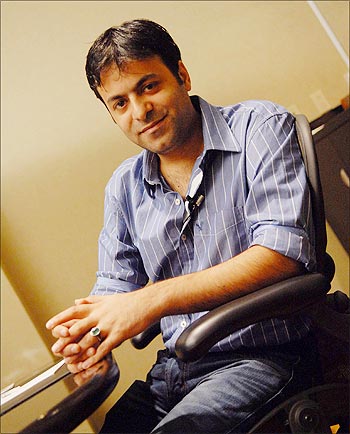
Filmmaker Tarun Mansukhani, 33, who was in New York recently to attend the I View film festival organised by the advocacy group Engendered, talked at length about his value system, the influence his mother has had on him, and the genres that are close to his heart as a filmmaker.
He has served as an assistant on a string of hit films before Karan Johar (whom he had assisted on many films including Kuch Kuch Hota Hai) asked him to direct Dostana. Mansukhani has also served as an assistant to Aditya Chopra on Mohabaatein and to Nikhil Advani on Kal Ho Naa Ho.
Before thius interview started in a suite in Radisson in mid-Manhattan, Mansukhani, who looks younger than he is, said he needed to smoke.
"No, you can't," I told him, smiling. "I am not smoking here," he said. "I am dashing off the street."
After the interview, he said, he enjoyed very much but he was going off to the street again.
"It was a good interview. Why do you want to smoke again?" I said. "You never know how the next one will be," he said laughing as he raced to the street corner.
You have announced Dostana 2. What are the challenges have you set for yourself?
It cannot be more of the same. As I am writing, I am constantly conscious of the fact that it should have new elements, new tension, new twists and everything about it should look and sound fresh.
Even the title?
I don't want to call it Dostana 2. I will be using the word in the title, of course, but it has to be far more imaginative than Dostana 2. It has to have an identity of its own. It is funny, even when Dostana was made, we had everything in place but the title came up the last. It might happen this time, too.
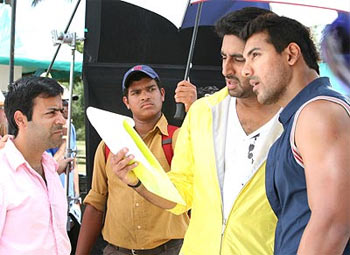
Did you have a sequel in mind before the film's release?
I did not even have an idea after the film was released nine months ago but a few weeks after its release Karan, Abhishek [Bachchan] and John Abraham began to ask me, "When are we making Dostana 2?" I was blackmailed emotionally! [Laughs].
I was thinking of making a more serious film than Dostana. I was also considering the thriller genre before they blackmailed me into doing the sequel.
Where is the project now?
I am fine-tuning the script, and I am also looking for a new city, perhaps in Europe, to shoot the film.
You have worked on several films that were shot in New York. Why did you then choose Miami?
I told the mayor of New York City that we will shoot our film in the city if there could be a few new bridges! [Laughs].
I think we have shot at most of the important locations in New York. For Dostana we wanted a city that seemed to have a younger spirit and life style that is quite distinct from New York.
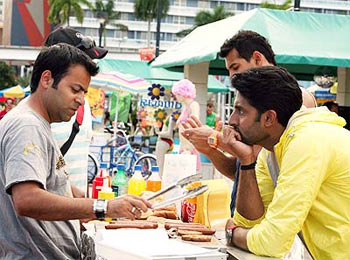
What do you think of Dostana now, in hindsight?
The film had about 40 percent of the dialogue in English. I feel there was no need for so much of English.
The movie did well in smaller cities and big towns but I feel it would have percolated deeper had it less English.
I also feel that the transition from the pre-interval scene to the next scene should have been stronger and better linked. To some people it felt like they were watching two movies. I hope to take care of these elements in the new film.
As an assistant director you have worked with a number of top actors...
Anyone who has worked as an assistant to Karan Johar is indeed lucky. You learn a lot from him, especially discipline and the use of a broad vision.
Secondly, you get to interact with some of the best known artists in India ranging from Shah Rukh Khan to Kajol.
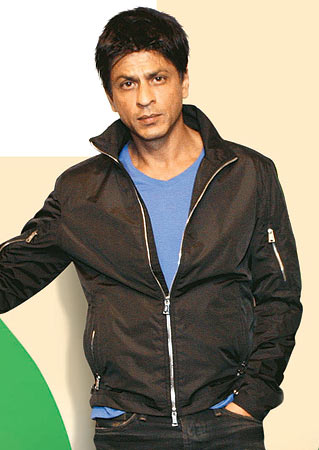
You have a huge admiration for Shah Rukh.
Apart from his professionalism and his ability to play Every Man, I admire his concentration.
What kind of a concentration are you talking about?
Imagine this. He is shooting a scene and he is following the director's guidelines, but he will do something that may make the director wonder.
Shah Rukh then will talk about what his character had done in another scene, something that was shot long ago, and connect it to the current scene.
His memory is phenomenal. He also studies each and every element of the character he is doing.
What else do you admire in him?
His energy; he is working -- at least in his mind -- when he has a physical problem or an injury. In 24 hours, he makes space for 48 hours.
What did he tell you after seeing Dostana?
He said something like this: I am glad my kid matured well and has made a film I can be proud of.
How long have you worked with Shah Rukh?
It could be 10 years. I have been an assistant director on six films featuring him. When he produced Paheli [directed by Amol Palekar], he asked me to be an assistant director. He trusts me completely. I am like a kid in the family.
And yet you did not think of directing a film with him.
Oh, I am thinking of it all the time but I believe that I should earn the right to direct him. Let me make couple of films and I am sure there is going to be a Shah Rukh project.
I don't think he would have said no had I approached him with a good script. But I felt that I admire him so much that I will first prove myself and only then I will go to him with a fine script.
It is like that when he agrees to act in my film, I am giving a bonus to myself. So let me make couple of solid films first.
What could be the movie that you offer to Shah Rukh?
Perhaps the film dealing with death. I have seen the death of some very dear friends; the death of my father is still a big thing in my life. And yet we have to look at death, I feel, from a different perspective.
But hasn't Shah Rukh died in many films?
Yes, but this film I want to make is more about how we look at the thought of dying. Considering that death is the only certain thing in anyone's life, that it is the only guarantee we have in life, I am baffled at people's fear about death.
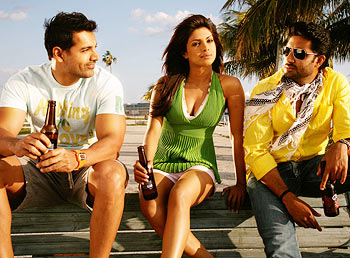
Anyone -- be it a writer or director or an actor -- whose first film is a hit would be worrying about the next project, and worrying about his or her professional life in general. What kind of fears to do you have?
I am an atheist and there is nothing in a religion that will make me scared. But I have a touchstone, a moral code. I always worry about letting people down, for whatever reasons. This is one lesson I learned from my mother. I do not want someone to say tomorrow, 'He let me down, he betrayed me.'
Your mother's influence is very strong on you.
My father died when I was 6. I have two older siblings but they too were small when our father died. Overnight, my mother became the man of the house. She taught herself a lot of things and she eventually became a successful businesswoman in Mumbai.
What are your thoughts on the current standards for Hindi films?
I feel that there is a tremendous change not only in Hindi films but movies of different Indian languages.
Thanks to multiplexes, we are able to show all kinds of films, movies belonging to a variety of genres.
Small budget films such as A Wednesday, and Rock On have done very good business. I have also admired films such as Luck By Chance.
And that tells you...
People often say the audiences in India have to grow up. I feel the audiences are quite smart in India. It is we, the filmmakers and writers, who have to grow up.